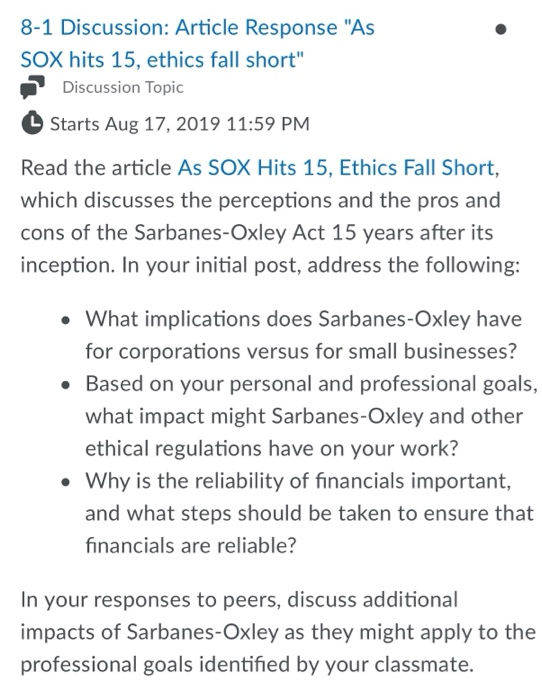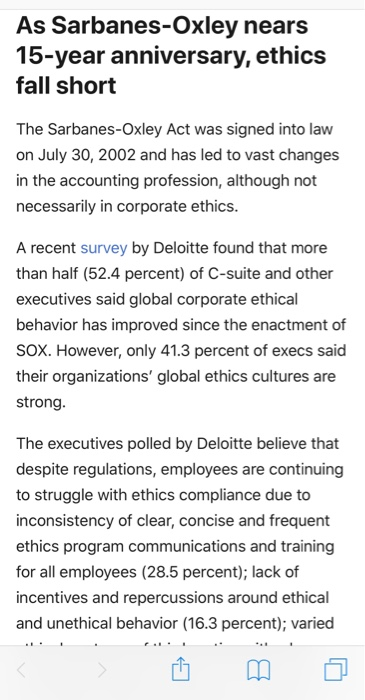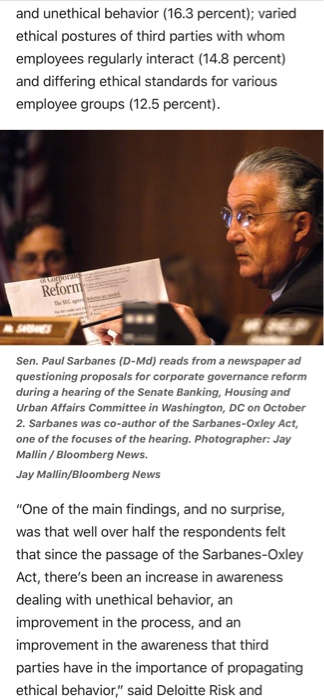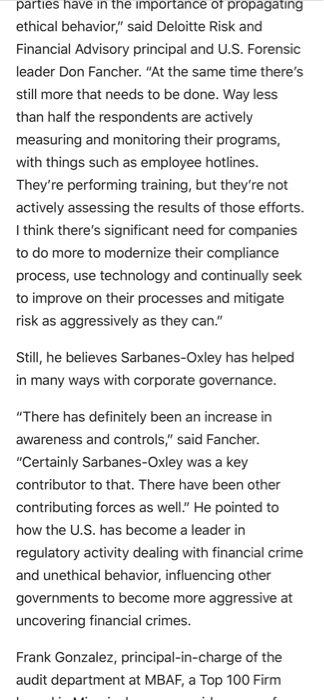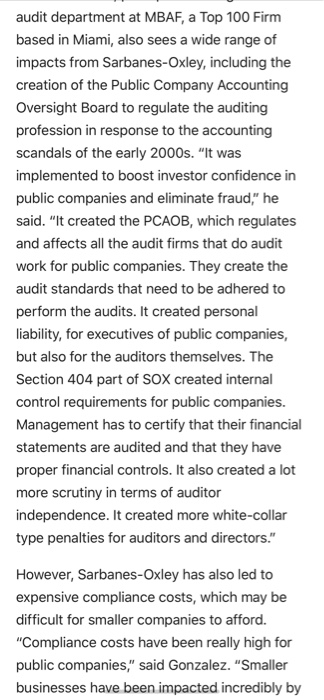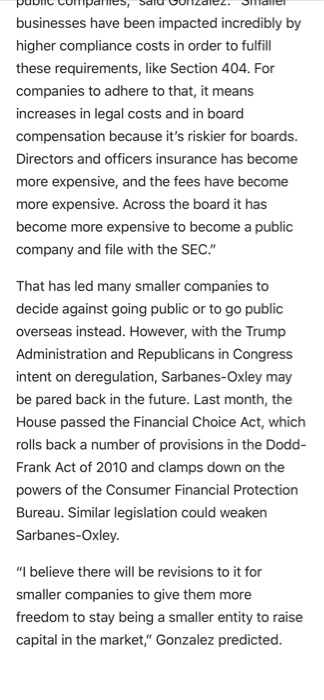8-1 Discussion: Article Response "As SOX hits 15, ethics fall short" Discussion Topic Starts Aug 17, 2019 11:59 PM Read the article As SOX Hits 15, Ethics Fall Short, which discusses the perceptions and the pros and cons of the Sarbanes-Oxley Act 15 years after its inception. In your initial post, address the following: What implications does Sarbanes-Oxley have for corporations versus for small businesses? Based on your personal and professional goals, what impact might Sarbanes-Oxley and other ethical regulations have on your work? Why is the reliability of financials important, and what steps should be taken to ensure that financials are reliable? In your responses to peers, discuss additional impacts of Sarbanes-Oxley as they might apply to the professional goals identified by your classmate. As Sarbanes-Oxley nears 15-year anniversary, ethics fall short The Sarbanes-Oxley Act was signed into law on July 30, 2002 and has led to vast changes in the accounting profession, although not necessarily in corporate ethics. A recent survey by Deloitte found that more than half (52.4 percent) of C-suite and other executives said global corporate ethical behavior has improved since the enactment of SOX. However, only 41.3 percent of execs said their organizations' global ethics cultures are strong. The executives polled by Deloitte believe that despite regulations, employees are continuing to struggle with ethics compliance due to inconsistency of clear, concise and frequent ethics program communications and training for all employees (28.5 percent); lack of incentives and repercussions around ethical and unethical behavior (16.3 percent); varied and unethical behavior (16.3 percent); varied ethical postures of third parties with whom employees regularly interact (14.8 percent) and differing ethical standards for various employee groups (12.5 percent). NI Refornt Sen. Paul Sarbanes (D-Md) reads from a newspaper ad questioning proposals for corporate governance reform during a hearing of the Senate Banking, Housing and Urban Affairs Committee in Washington, DC on October 2. Sarbanes was co-author of the Sarbanes-Oxley Act, one of the focuses of the hearing. Photographer: Jay Mallin / Bloomberg News. Jay Mallin/Bloomberg News "One of the main findings, and no surprise, was that well over half the respondents felt that since the passage of the Sarbanes-Oxley Act, there's been an increase in awareness dealing with unethical behavior, an improvement in the process, and an improvement in the awareness that third parties have in the importance of propagating ethical behavior," said Deloitte Risk and parties have in the importance of propagating ethical behavior," said Deloitte Risk and Financial Advisory principal and U.S. Forensic leader Don Fancher. "At the same time there's still more that needs to be done. Way less than half the respondents are actively measuring and monitoring their programs, with things such as employee hotlines. They're performing training, but they're not actively assessing the results of those efforts. I think there's significant need for companies to do more to modernize their compliance process, use technology and continually seek to improve on their processes and mitigate risk as aggressively as they can." Still, he believes Sarbanes-Oxley has helped in many ways with corporate governance. "There has definitely been an increase in awareness and controls," said Fancher. "Certainly Sarbanes-Oxley was a key contributor to that. There have been other contributing forces as well." He pointed to how the U.S. has become a leader in regulatory activity dealing with financial crime and unethical behavior, influencing other governments to become more aggressive at uncovering financial crimes. Frank Gonzalez, principal-in-charge of the audit department at MBAF, a Top 100 Firm audit department at MBAF, a Top 100 Firm based in Miami, also sees a wide range of impacts from Sarbanes-Oxley, including the creation of the Public Company Accounting Oversight Board to regulate the auditing profession in response to the accounting scandals of the early 2000s. "It was implemented to boost investor confidence in public companies and eliminate fraud," he said. "It created the PCAOB, which regulates and affects all the audit firms that do audit work for public companies. They create the audit standards that need to be adhered to perform the audits. It created personal liability, for executives of public companies, but also for the auditors themselves. The Section 404 part of SOX created internal control requirements for public companies. Management has to certify that their financial statements are audited and that they have proper financial controls. It also created a lot more scrutiny in terms of auditor independence. It created more white-collar type penalties for auditors and directors." However, Sarbanes-Oxley has also led to expensive compliance costs, which may be difficult for smaller companies to afford. "Compliance costs have been really high for public companies," said Gonzalez. "Smaller businesses have been impacted incredibly by public Companies, Salu Uzalez. Baile businesses have been impacted incredibly by higher compliance costs in order to fulfill these requirements, like Section 404. For companies to adhere to that, it means increases in legal costs and in board compensation because it's riskier for boards. Directors and officers insurance has become more expensive, and the fees have become more expensive. Across the board it has become more expensive to become a public company and file with the SEC." That has led many smaller companies to decide against going public or to go public overseas instead. However, with the Trump Administration and Republicans in Congress intent on deregulation, Sarbanes-Oxley may be pared back in the future. Last month, the House passed the Financial Choice Act, which rolls back a number of provisions in the Dodd- Frank Act of 2010 and clamps down on the powers of the Consumer Financial Protection Bureau. Similar legislation could weaken Sarbanes-Oxley. "I believe there will be revisions to it for smaller companies to give them more freedom to stay being a smaller entity to raise capital in the market," Gonzalez predicted
